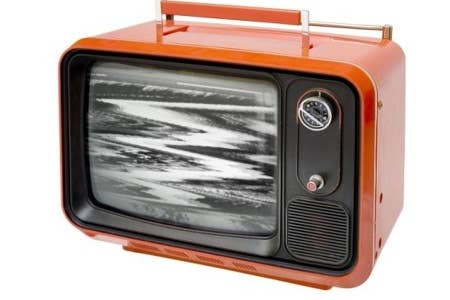Why TV is Better Than Games
Why not apply some of the lessons learned from TV to games, asks Mark Sorrell?
TV, is big. Really big. You just won't believe how vastly, hugely, mindbogglingly big it is. I mean, you may think that videogames are pretty big, but that's just peanuts compared to TV.
Very roughly, videogames are worth maybe $60 billion a year, worldwide. Movies are about $50 billion and music perhaps $40 billion. TV is worth $300 billion a year. $300 billion. So TV is twice as big as videogames, movies and music put together. Well done TV. In your face, videogames.
But TV is shit, right? It's some archaic way of pushing hot guffs of entertainment out into a largely uncaring universe full of fat people on sofas, in track-pants, eating crisps. The internet will kill it before the end of the afternoon, we'll all be getting everything via video-on-demand and social search, beamed directly to our iPads, and all broadcasters will be broken-up for scrap and whatever's left over will be thrown into the sea.
"Video games glitch and break. They're buggy, and if you're playing anything more traditional than Angry Birds, they require some knowledge of formats and controllers"
No, nope, wrong, TV is brilliant and it won't be going anywhere for a very long time indeed.
TV is a cultural phenomenon. It's not a piece of technology. Inventor Danny Hillis described technology perfectly as 'things that don't work yet'. TV is not technology. It just works. You press a button and television happens. You press the same button later and TV stops happening.
Video games are definitely technology. They glitch and break, are buggy, and if you're playing anything more traditional than Angry Birds, require some knowledge of formats and controllers and tropes and I could go on. I could mention PSN if you're not convinced. Time spent watching TV is going up, and it's going up faster than time spent playing video games. And remember, economically, TV is six times bigger than video games.
So we're all agreed then, TV is great, Games are rubbish. Well, no-one has actually told TV. Those guys are still all pretty convinced that games - being the new kid on the block and having all that engagement and all those revenues and that whole social thing and the crazy mobile thing and the stuff with fremium - are the future and thus TV must be afraid and then copy games and steal from games. TV people reckon that maybe they should be doing some, hmm, some kind of adding bits from games to TV. Hmm.
And so to gamification. The view of gamification from the video game world is one of open scorn and derision. Pointsification. Badgification. Adding the most ephemeral of gaming's accouterments to whatever it is you want to hawk to the plebs and call it a day.
The video game world is largely right. The main problems with the gamification concept are that a) it is supported largely by people who work in marketing and hence don't know anything at all about anything at all and b) it has nothing whatsoever to do with games.
Gamification is often described as 'adding game-like elements to things that are not games'. That's not really what it is at all. Those game-like elements aren't anything to do with games, they are behavioural economics. Normal economics believes that people are rational and act in their own self interest, and then goes off on one from there. That is, sadly for economics, not true. Behavioural economics makes no such assumptions. It's the study of what people actually do. The study of the world as it is, not the way we wish it were.
Behavioural economics is what powers all that fremium stuff, that social stuff that make games so more enticing than TV in the first place. Not game mechanics. Engagement, fremium, social - all behavioural mechanics in tooth and claw. Games are very good at behavioural economics, but game mechanics aren't behavioural economics.
"Games need risks to make them feel rewarding and failure is not the kind of thing that marketeers want their brand to be associated with"
The other big issue with gamification is that even when it really actually is using actual game mechanics actually, it does so very badly. Games need risks to make them feel rewarding and failure is not the kind of thing that marketeers want their brand to be associated with. And because, as discussed, marketeers are awful and terrible in every way that a person can be, they didn't even bother to learn the first bloody thing about what a game is in the first place. There are, by my count, eight people in the entire world who understand games properly and I'm entirely sure that none of them work in marketing.
But wait. Let's remember the whole thing about $300 billion for a moment. If games have something to teach TV, Benjamin Franklin reckons that TV has six times that many things to say to games. If you wanted to learn from TV, if you wanted to add TV-like elements to things that are not TV, if you wanted to do some telification, you wouldn't want to make the same errors of presumed knowledge and the same awful assumptions that gamification proponents made. If video games are going to learn from TV, we're going to have to actually learn from TV and not something that can be easily mistaken for TV by idiots, right?
So what is TV in the first place? Like, really?
TV can be thought of as three different things. Firstly, the box that sits on your wall. TV the physical item. Then there's TV as in the kind of content you watch on your TV. The soap opera, the sitcom, the reality show. Ways of formatting linear video to extract maximum human drama and space for ad breaks. Lastly, there's the medium itself, the scheduled, broadcast of linear video. Box. Format. Medium.
It's this last definition that's the one that's the most interesting to videogames. Video games have already made the biggest impact to the TV box that it's ever experienced, simply by existing. You plug your videogame console into your TV and suddenly your TV has an entirely new function. A function worth $60 billion a year, let's not forget.
TV formats correlate reasonably well with video game genres.
Where TV and video games diverge dramatically is in the way they work as a medium. TV has three core features - it's scheduled, it's broadcast and it's passive. Video games do none of these things.
Sure, some video games are linear experiences, some of them to a stultifying degree, but they're not scheduled. At 8pm it might well be time for Eastenders, and we might all be cool with that, but the idea of 8pm being time for Zelda is ridiculous to most people. And that's not just because 8:00pm is blatantly time for Gran Tursimo.
Why's that then? One of the best things about TV is the fact that you don't have to choose what you want to watch. You just turn the sucker on and it blasts colours and shapes, some of which might be moving, straight down your eyeholes. It's easy. Video games make you actually get up off the couch and choose what you want to play and then put a disc in a black machine that is probably going to break soon. What the hell, people? Have you any idea what kind of day I had at work today? I can't be bothered to feed myself, I certainly can't be bothered to actually choose how to be entertained.
And broadcast. Games aren't broadcast. Sure you can play with your friends, if you got enough of them and you're playing an MMO, you can get maybe 25 people playing along at the same time. Great, well done. In 2011, 111.3 million people watched the Superbowl. We share gaming experiences, sure we do, but the scale on which we do so is infinitesimally small compared to TV.
"111 million people watched the Superbowl. We share gaming experiences, but the scale on which we do so is infinitesimally small compared to TV"
So as far as I can tell, the biggest source of traffic on twitter is news. The second is TV. That makes a lot of sense. Twitter is a broadcast medium. If you want to speak to a whole bunch of people you don't really know very well, then the experiences you've all shared would be a pretty obvious place to start. So making a joke about how David Cameron looks like a penis with a face drawn on it will work because the audience know who he is! Also, it is true.
In much the same way, we can tweet about TV and everyone else who is watching the same thing at the same time can GET INVOLVED IN THE CONVERSATION. This is social proof, and social proof on a grand scale. This, again, is behavioral economics. And compared to TV, video games are shit at it.
So why not maybe give it a try. Maybe try sticking some video games in a schedule, broadcast them to your audience. See how it feels to know you're playing exactly the same thing as a million other people at exactly the same time. See how that feels? $300 billion says it feels pretty good.
Mark Sorrell is development producer for games and broadcast at Somethin' Else. You can follow him on Twitter @sorrell









